Brown University built and operates the clinic at Guachipilincito, the small community about an hour’s walk or an hour’s drive from Concepcion. That sounds strange to say to those of us that are accustomed to cars driving along well paved roads, or distances that can be measured by a straight line extended from point A to point B. These assumptions don’t apply to Guachi, a place very close and yet so far away.
Brown has been coming down for many years. They are physically present in a brigade two times a year, but their presence there is more constant then that. There are various programs and supports that they have invested in for the people of Guachi that connect them to the wider world. But it’s very hard to maintain. Maybe it’s like building a sand castle along the shore during low tide. That’s not to say it’s a fool’s errand, but just that as close as one gets to Guachi, it seems to stay far away. But Brown has built buildings and relationships, is committed to ongoing service, makes the journey regularly, and something, though elusively hard to define, remains.
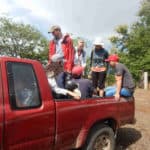
I was looking forward to meeting the nine person brigade, Brown University now partnered with Wingate University, School of Pharmacy. Wayne Hale, a man of great talent and knowledge, is always asking penetrating questions because he readily recognizes the inadequacy of his talent and knowledge. I was looking forward to the stimulating conversation, the discernment of strategy and service, but the necessary response to unanticipated challenges kept Brown/Wingate, Wayne, and Guachi distant. Two of their brigade members, one a medical student and the other a resident, found themselves even further away from Guachi as they did not make it onto the planes flying from the US to Honduras. I went to Tegucigalpa on the next day to escort them into the Frontera; six hours in for me and eight hours back for them. They got there a day late, but that is not so surprising when you think of the almost insurmountable chasm of distance between Miami or Atlanta and Guachi. I never got to Guachi during their week here. Another brigade in Camasca, the presence of a board member and the need to translate, innovative and exciting improvements at our bilingual school, and a series of other demands made that distance to Guachi even further. Thank God there’s two of us, because Laura did get there.
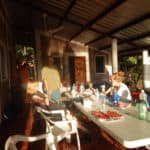
She went to Guachi with two Honduran, Shoulder to Shoulder doctors, one from our main clinic in Concepción and the other from the town clinic. She arranged for them to sit down and dialogue with Wayne, Judy Steinberg (the board president for the Guachi mission), and with other brigade members. They spoke about our Convenio system of care. They spoke about how to make referrals. They spoke about how to collaborate in mission. They spoke about the health and well-being needs of the people in Guachi. They spoke about how Brown/Wingate could help in ongoing care and how Shoulder to Shoulder’s presence and work in the Frontera could help bring effectiveness to the mission in Guachi. In a word, they spoke about how to bridge distances.
That is the main focus of our work here. It would be so easy if there weren’t so many mountains. It would be so easy if we had good roads. It would be so easy if Honduras weren’t so poor, or if the Honduran government would actually fund health care. It would be so easy if there weren’t so many cultural divides, or if we all spoke the same language. It would be so easy if Guachipilincito wasn’t that place that seems so close, but is really a world away. So, you build bridges. This is tremendously difficult work. It takes more than goodwill, talent, and knowledge. It takes an investment in humility and vulnerability, a patience that understands that the seemingly short distance is actually very far.
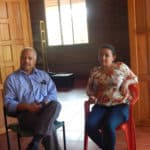
I didn’t get to Guachi. On the day that they were leaving, they hiked into Concepción. A truck would transport their luggage to their bus. The bus can’t get to Guachi because of the road. The bus would pick them up outside of our house in Concepción. I met them in the town square during market day: vegetable, fruits, venders, and pirated DVDs in every corner. They were all smiles, shaking my hand and introducing themselves. Their brigade was a great success. I was feeling some guilt that I had not gotten to them or to Guachi in the week that they were here. They, however, treated me as an old friend, and were excited to get to my house and see Laura again. At the house, they rehydrated after the arduous, hot, hour plus walk over mountain and dale. They had a few minutes to relax on our porch.
I spoke with Lynn, Wayne’s wife. I apologized for not getting to see them this week. We also talked about how sometimes it’s hard to know what’s best to do with limited resources and Guachi being so far away. She told me of a woman she met. The woman suffered with dwarfism and her feet were turned out perpendicular to her body. She walked with great difficulty. They had found some paper and traced the outline of her feet. With that they managed to buy shoes that fit her. She walks easier now. Lynn’s take on the whole thing (something she and her husband have been involved with all of their lives) was that you do what you can with what’s placed in front of you in the moment. What more can be expected? That was what she, and they, did for the woman she met. I thought about these great distances. This one woman was probably further away from the rest of the world than anyone in Guachi. Yet, she was found. She was met. She was honored. Maybe Guachipilincito is not as far away as it seems.
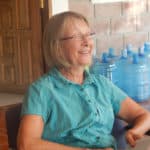
Thanks, Brown/Wingate Brigade, for making it to Guachipilincito.
Message from CEO Wayne Waite and Christina Waite
It Was the Best of Times….
Some English guy, Dickies, or Dicksburg, I guess it was Dickens, wrote this book that I read in High School. In high school, most of us were stupefied by the oxymoronic opening line, “It was the best of times, it was the worst of times,…” It is cruel to expect a high school student to appreciate the wisdom contained in the classic phrase. For them, it is simply inane to describe anything as both the best and the worst. Only with lived experience does the inherent ambiguity of life become clear (or perhaps more completely muddled). With time and memory, failures are redefined successes, disappointment becomes hope, and life itself is elusive and mysterious. To gain wisdom is to be humbled. Wisdom is perhaps simply knowing that neither our intention nor expectation determines outcome. For all of our planning, our critical considerations, our need to control all variables, our intentional designs, outcomes are always a surprise. Some might call this Karma, or God, or simply mysterious principles of the universe. It is the worst: an unanticipated outcome for which we now must take responsibility. It is the best: something far beyond our limited design.
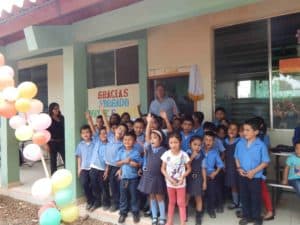
This aura of best and worst engulfed us this past week. Our board president, Attorney Wayne Waite, and the board secretary, Mr. Dwight Armstrong, arrived in Honduras on April 13. They were stretched this way and that in high powered meetings with Honduran government officials, US embassy representatives, university deans, local mayors, humanitarian organizations, Shoulder to Shoulder staff and supporters, and so many others. Draining as it must have been, they did find moments to refresh their spirits. The children at the Good Shepherd Bilingual School greeted them with the exuberance of youth. Dwight, a man of the earth, had the chance to breath in the rejuvenating air of a Camasca farm. Both of them had a moment to relax in our humble home in Concepcion where we listened attentively to their life stories and witnessed their admirable commitment to Shoulder to Shoulder. More meetings and visits followed them on their trek back to Tegucigalpa. Dreams and anxieties, the beauty of mission and the challenge of execution, the satisfaction of achievement and the weight of planning for the future, traveled with them, filling their heads and hearts in preparation for the board meeting.
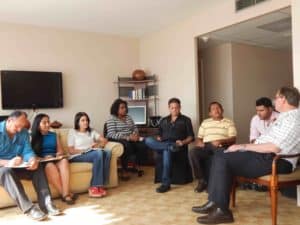
On Saturday morning, the Hombro a Hombro Board (the board for our Honduran NGO) began its deliberations. Laura and I were asked to attend. We believed we would be there for Saturday and leave on Sunday. But we were asked to stay on first until Monday, and then again until Tuesday. We hadn’t brought enough clothes and ended up washing them in the sink. The discussions were inspiring and animated. There are such great opportunities present to Shoulder to Shoulder in its mission of empowerment with the people of Intibucá. Our work in education is bringing hope to children. The potential in agricultural development and food security promises a path to prosperity in the Frontera. Our collaborative work with brigade partners and our expansion in new service areas bring well-being and health to the isolated and forgotten. The value of our present service and these golden opportunities for future service enliven us. But lest our euphoria swell our egos, serious challenges also confront us. Like any charitable organization, our slim and stretched resources threaten our goals. We also see our faults. We could be better organizers. We could be better communicators. Simply, I suppose, we could be better. On top of all this there is the stickiness of working collaboratively. The others, our partners, always have designs different than our own. Why can’t they just recognize that we are right and stop inserting their own thoughts? (It’s a joke)
So we have the best, and so we have the worst: our hearts exploding with joy and our minds crippled with angst. It would be so nice if our deliberations followed a clear and linear path. But rather our deliberations are circular, popping from one theme to the next, always elusive and exhausting. What should be our response? Should we follow our hearts? Should we follow our heads? These questions forever elude any answer.
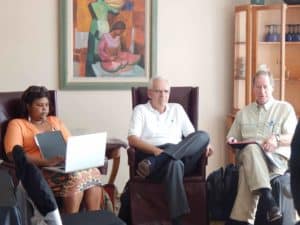
Monday afternoon I’m soaping up and rinsing out my few articles of clothing in the hotel room’s sink, feeling very sorry for myself. I despise doing laundry, even more so when I have to do it by hand which is more often the case than not here in Honduras. The questions weigh on my head and heart. Again feeling sorry for myself, I ask, “Why does it need to be so hard?” The answer I receive humbles me. It is hard because it is important. Ease is not the goal. Purpose, meaning, justice, and connection, these are the goals. These are not easy. I realize that anything in my life that has lasting value is difficult. It is only in recognizing and accepting the challenges, standing in the storm if you will, when dreams are dreamt and missions exercised. This interplay between the best and the worst is how we realize the integrity of service and justice. More mundanely, I feel some shame knowing that most Hondurans wash their clothes by hand without complaint. My petty ego needs to get out of the way.
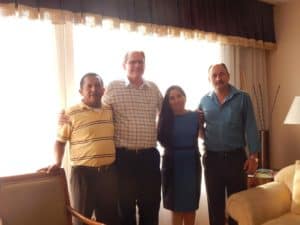
Shoulder to Shoulder is doing incredible things to empower the people of Intibucá. Shoulder to Shoulder will invest in even more meaningful missions, deepening relationships of trust and commitment with the people and associations in Intibucá and Honduras. It is the best of times. None of it happens without facing strong head winds. We will design and plan, consider and decide, and seek out donors and partners to share our mission shoulder to shoulder. This, as necessary as it is, will not yield success. It is not the keenness of our minds, nor the professional quality of our planning, nor the wealth of our endowment, that secures the rightness of our mission. It is the integrity of the heart. If we maintain the integrity of our hearts, our dreams will wake. The results will not appear as we had envisioned. They will be so much better than the limits of our minds. They will flood our hearts with joy.
Indeed, these are the best of times, these are the worst of times… And the story continues…


